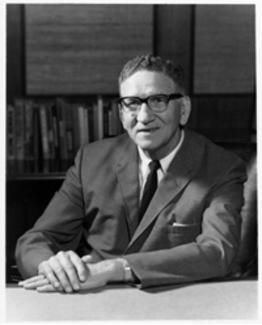In 1938 "Ab" Kirwan returned to his collegiate alma mater as head football coach. The first Kentucky alumnus to hold the coaching job, his teams compiled a record of 24 wins, 28 losses, and four ties. Later in his career he was to serve as chairman of the Infractions Committee of the National Collegiate Athletics Association and as a member of the Executive Committee of the Southeastern Conference. He retired from coaching in 1945 to pursue a doctorate in History, which he received from Duke University in 1947.
From 1947 to1950 Kirwan served as Dean of Men of the University of Kentucky and from 1950 to 1954, as Dean of Students. At his own request in 1954 he was relieved of his administrative duties and was appointed Professor of History; he devoted full time to classroom teaching until 1960, when he was named Dean of the Graduate School.
Dr. Kirwan's magnus opus-John J. Crittenden: The Struggle for the Union, researched while Kirwan was on leave as a Guggenheim Fellow in 1960-61 and published in 1962, received a $500 research award from the UK Alumni Association, as well as the Charles S. Sydnor Prize as the outstanding book on southern history for 1962-63. In 1966 he received, again from the Alumni Association, $500 in recognition of superior teaching, an honor for which he was nominated by members of the University's scholastic and leadership societies, and during 1966-67, after resigning the Graduate School deanship, taught as a Fulbright Lecturer in American History at the University of Vienna. In 1967 Kirwan was selected by his departmental colleagues as Hallam Professor of History and was elected, as well, "Distinguished Professor of the College of Arts and Sciences" for 1967-68. He co-authored with Dr. Thomas D. Clark a second major work-The South Since Appomattox: a Century of Regional Change, published by Oxford University Press in 1967. Other books in the area of the Civil War, his historiographical specialty, include Rednecks in Revolt (1951), Johnny Green of the Orphan Brigade (1956), and The Confederacy, which he edited in 1959.
Upon the resignation of President John W. Oswald in 1968, Kirwan was named a member of the joint faculty-trustee committee to nominate a successor. In July of that year he was elected Interim President of the University of Kentucky, occupying that position until August of 1969. Serving at a time of campus unrest, in an essentially caretaking capacity, and presiding over an "acting administration" composed largely of interim administrators appointed by Kirwan himself; he declared it his intention to maintain the programs initiated by his predecessor. In the words of the September, 1969 Board of Trustees resolution officially naming him retroactively "Seventh President of the University of Kentucky"-"Dr. Kirwan brought to the campus a feeling of serenity and peace, renewed confidence and strengthened morale." He died suddenly of a heart attack on November 30, 1971.
